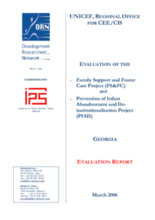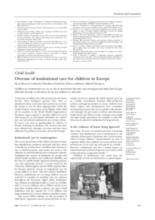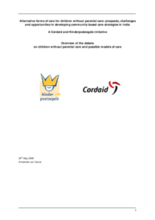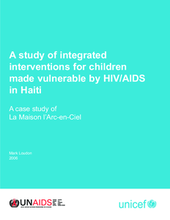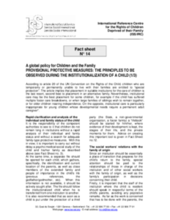Displaying 581 - 590 of 668
Practical and professional paperwork for residential care including registration and assessment forms, application for renewal of licences, referral forms, and emergency admission forms. Can be modified for different country contexts.
A set of standards for measurable quality in service provision for children living in homes. Outlines the rights of a child, planning and legalizing children’s care, children’s home administration, management and staffing, and safeguarding child welfare while in the home, which includes nutrition, health, education and religion.
Documents assessment of child welfare and protection of children in orphanages in Liberia.
Assessment of two recently reformed child protection projects in Georgia (Prevention of Infant Abandonment and De-institutionalisation (PIAD) and Family Support and Foster Care (FS&FC)). Includes detailed evaluation methodology and lessons learned.
This article discusses the use of institutional care for children in Europe and shows that it remains common place despite the evidence of harm for children, including attachment disorder and developmental delay.
Detailed examination of debate over institutional and alternative care methods for children without parental care. Includes comprehensive framework for collective action.
Examines a community-based care program for children living with HIV in Haiti called Arc-en-Ciel. Includes an overview of services provided (residential care, home based care, and community mobilization) and lessons learned.
A website that contains statistical information on children in 27 countries across Central and Eastern Europe. The site contains relevant child protection indicators, including the number of children in institutional care.
Save the Children's "First Resort" series focuses on the needs and rights of children who, for a wide variety of reasons, are lacking adequate parental care. This third paper in the First Resort series presents practical examples of the range of options available to policy-makers, practitioners and others with responsibilities for the care and protection of children without adequate parental care.
A brief 2-page overview of what steps should be taken if and when a social worker or other community worker admits a child to a residential institution.



